This article first appeared in the Nov/Dec 2012 issue of World Gaming magazine.
If Mr Francis Lui, Vice-Chairman of Galaxy Entertainment Group, is not the most powerful man in the entire Asian gaming industry, he is certainly on the final shortlist of candidates. His father, Dr Lui Che-woo, is Galaxy’s Chairman and has already anointed his son as his eventual successor. Mr Lui graciously agreed to sit down at Galaxy Macau with our CEO Andrew W Scott for a wide-ranging interview on Galaxy Entertainment, the wider Macau society and the vision for Macau over the next decade.
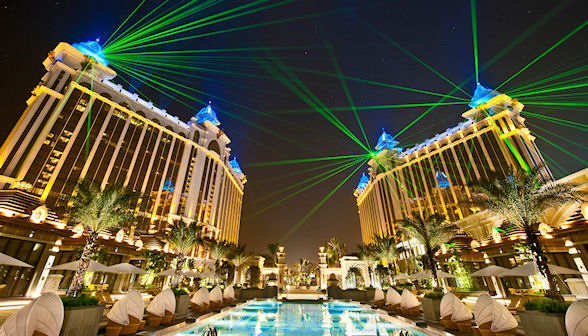
Andrew W Scott: Mr Lui, thank you so much for speaking to the readers of World Gaming. As always, it is an honor to speak to you and I’d especially like to thank you for agreeing to talk about such a varied range of subjects. It’s an extremely interesting time in Macau right now and there is so much to talk about, so let’s jump right in.
Macau’s Future
AWS: Macau has seen average year-on-year growth of 34 percent over the last six years, culminating in gross gaming revenue of MOP$256 billion (US$32 billion) last year. Earlier this year you suggested growth for 2012 might be around 18 to 25 percent. What is your opinion regarding growth over the next decade or so? What do you think the gross gaming revenue in 2020 might be?
Francis Lui: Well, Andrew, thank you first of all, it is always a pleasure talking to you. I think the question is a good question. For the short term, I think we are going to go up and down. A lot of people make an issue out of each month, but I think we should look on a longer basis. Before we answer the question about 2020, everybody has to realize this is a two-way thing. If we are offering the right product, if we are providing the right service, if the local government is doing the right thing in terms of getting the imported labor problem resolved, getting the infrastructure in place and so on, I think the sky is the limit. We know that China has 1.3 billion people, and GDP growth is around 7 to 8 percent a year. It’s such a huge economy. People are predicting the Chinese economy in 2020 or 2030 is going to be double the size it is today, so it will be bigger than the US. Macau is the only city [in China] in which gaming is legally allowed. If we have the central government continuing to support us by opening up the door and allowing visitation, I think we have to do the right thing by diversifying the economy, creating innovation and growing our non-gaming industries. Once we have that in place, I will confidently predict we would easily be talking about MOP$300 billion, easily increasing by 25 percent year-on-year. We should be looking forward to doubling to MOP$600 billion or even more. You have to believe in the China story, and the growth of the middle class in China. I estimate China’s middle class is around 100 million people, and I think by 2030 it will be 300 million. If you believe that number, then right now we are just getting warmed up.
AWS: So this market could triple, it could quadruple in the next 10 or 15 years?
FL: If everybody does the right thing. Tripling, quadrupling, it would be no surprise to us.
AWS: The licenses for SJM and MGM expire in March 2020, and for the other four concessionaires Galaxy, Melco Crown, Sands and Wynn in June 2022. This is less than ten years away. Do you think the licences will be re-issued to the existing six concessionaires on the same terms, or might there be new terms imposed, or possibly an opportunity for new players to enter the market?
FL: Well, it is a good question, especially with so many new developments in Cotai in the next three to four years, it begs the question, as banks will ask about whether they can recover loans in time before the license runs out. I feel all six of us stand a very good chance of getting our licenses renewed. Over the last 10 years, I would say every one of us has done more than was asked to grow the market in Macau. Whether the government is going to impose other requests or not remains to be seen. Certainly there is no secret the government wants us to diversify and do more on nongaming products, like drawing conventions to Macau, creating a world-class leisure hub and so on. As long as we are doing the right thing, I think the chance of getting a new license is looking good. This is all predicated on the fact that we are not the decision maker, we are just following what we are expected to do to make sure we support the government going forward.
AWS: What about new players? Companies like Genting and Caesars must look jealously at this market, they missed their chance. What do you think about their chances in 2020 or 2022?
FL: In 2002 there were originally three licenses, and that was bumped up to six, a doubling of the original number. We have all done a lot of investing, so I think the government has to consider allowing the six to have a reasonable return. If we are doing a good job, growing the market and doing what the government has asked us to do, expanding gaming and non-gaming and diversifying the products, then they should allow us to continue without introducing unknown factors into the industry and disturbing it.
AWS: Baccarat is the most popular game in Macau, but for Macau to truly claim it is an international destination it needs a range of the games that international visitors expect: roulette, blackjack, sic-bo, pai gow, poker and more. But with the table cap in place operators are forced towards the most profitable game, baccarat. In many casinos, baccarat tables make up 90 percent of tables and this proportion is on the rise. Poker was thriving and giving Macau a fantastic profile internationally, but this problem has affected poker’s viability in Macau. The four Macau mahjong rooms are affected. There are now only three or four pai gow tables in all of Macau. Should there be some kind of exemption from the table cap for games like poker, which give Macau a worldwide profile, or culturally significant games like mahjong, pai gow and fantan?
FL: I am inclined to feel the government should work a little bit closer with the industry. Like you said the government wants diversification. Even gaming needs diversification, to attract different types of players to Macau. You should not have 99 percent of the gaming just baccarat. This is an interesting topic for discussion. The industry should work together with the government to find a way to expand our exposure to different types of player. I encourage the idea that we sit down and talk, to let them know what kind of challenges we are facing, compared with other gaming industries around the world.
AWS: Has there been an effort to do that, to sit down and talk with the government about this issue, either by Galaxy or any other operators?
FL: Well, it is starting to get everybody’s attention, I think. There are already some dynamics moving around. There will probably be some discussion in the future, I expect.
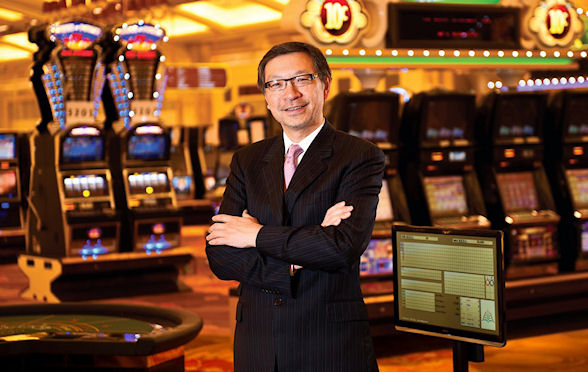
AWS: We have 32 operational casinos in Macau, with a BIG9 first-tier of City of Dreams, Galaxy Macau, Grand Lisboa, MGM, Sands, Sands Cotai Central, StarWorld, Venetian and Wynn. Next could be Macau Studio City. MGM, SJM and Wynn all have plans for major Cotai-based properties in the next few years, and Mr Adelson has announced his next property, the Parisian. Assuming there were no issues with labor supply, is there enough demand for even more first-tier properties in Macau?
FL: If we feel the market can grow 20 to 25 percent each year, then we are going to need more integrated resorts. Definitely I wonder whether we should stop now and take a look. Maybe we can count five or six coming, and whether there is any room for more very much depends, like you said, on whether the infrastructure and labor is there. Assuming those are not obstacles, I would say perhaps we need more.
AWS: Could you hazard a guess on how many first-tier properties we could have in 10 years?
FL: Well, we have 5,500 tables between us, and each of us probably needs about 400 tables to drive each new major gaming resort. I guess if you are talking six new properties, well that is 2,400 tables, and that would only give you another say 50 percent growth. Now if you are talking about 200 to 300 percent growth in the future, then you probably need a lot more than this.
AWS: It seems we’re saying on the one hand growth is almost unlimited but on the other hand we have this cap of 5,500 tables, increasing by just 3 percent per year. There’s a conflict, isn’t there, between those two things? One of them has to give. Either the table cap has to be massively revisited or we’re going to have a huge problem of pent-up demand. What do you think the resolution is?
FL: Well, first of all we should use the tables more efficiently. You can already see a dynamic happening where tables are moving from less efficient to more efficient areas. All the companies are doing this, and I would expect that to happen more in the future. The government has to watch this issue very carefully, because the table cap was a number decided a couple of years back. If the economy and the future look a bit different, I think the government should look at it pragmatically to see how they can work together with the industry to make sure the vision of what Macau can be, will materialize in front of us. So, I think this would be another interesting issue we could, if possible, communicate with the government on.
AWS: The average stay in Macau is steady on 1.5 days. Will we ever see that number increase to 2.0 days?
FL: That is really a number that we are not happy with ourselves. When we opened Galaxy Macau, one of our objectives was to extend the stay, for us at least, from 1.5 days to a number higher than that, hopefully about 2 days. But it didn’t happen yet. As you know, we are experiencing a weaker economy this year. That might be one of the reasons. But in the medium to long term future, I still have a lot of confidence that we should have more extended stays from our customers, as long as we continue to give out innovative and creative products, as long as we are not repeating ourselves. If we have repeat products, we probably cannibalize the market. You need new innovative products in order to grow. We know there are a lot of customers on the other side of the border, and the central government is being supportive in opening that floodgate, allowing the customers to come in. Just a couple of months ago, they announced they would allow the residents of nine major cities in China to come to Macau and Hong Kong, so we know the gestures are there. It is just whether we will take up the challenge, to make sure we have the products and services to attract them to come over.
Macau Infrastructure
AWS: The labor issue is clearly the most serious problem facing Macau right now. The current unemployment rate is 2.0 percent, amongst the lowest in the world. If we believe the generally accepted rule that three percent of an economy’s workforce is essentially unemployable, then a third of Macau’s unemployable somehow have a job! A few months back SJM’s CEO Dr Ambrose So said, at least as far as SJM goes, there is, “no urgent need to employ foreign labor.” But in February you said that the Macau government should allow foreign labor albeit a very modest 5 percent of casino dealers. There have been suggestions that Macau reach out to its near neighbors in Hong Kong and Guangdong province for the additional labor we need. The size and quality of the Macau workforce is just as fundamental as hard infrastructure like roads or bridges. How is Galaxy addressing this problem, and what are your thoughts on the labor issue for the industry as a whole?
FL: Well, I’ll answer the second question first. For the economy here to continue to grow, we need to look into the labor issue pragmatically. We have two percent unemployment, and many of the local people are in the entertainment industry because this is where the money is. In the longer term, it is not healthy for Macau because we do not want to see the entire workforce working in the casinos. I think the current workforce has an education level a bit lower than a world city like Hong Kong or New York. The way forward is to make sure we provide a proper education for local young people so they know they are well equipped to move up the management hierarchy. At the same time, I feel we should have an imported labor policy. This way, we provide a career path for the local young people so they have a sense of security they are not losing their jobs to somebody from overseas. We could get the best of both worlds. We import labor to take on more labor-intensive jobs, like the dealer job for example, and hopefully the local people would move up. As we continue to educate our young people, we should let them know they have the priority in getting a better job. The last ten years is the best ten years Macau ever had, but is that ten years enough for the household to feel they already have enough money in the bank to buy a house, and to live comfortably? Regarding Galaxy, we just have to comply with the regulations here and continue to give priority to local people, and provide the best career path and training for them so they know when they keep working at Galaxy, we will be the first ones to promote them if the opportunity arises.
AWS: Let’s move on to the subject of border crossings. We constantly hear complaints about the China border and the Hong Kong ferry. At peak times it can take up to two hours. For those coming here for a day trip, this waiting time can be a large portion of their trip. It is not good for the operators to have somebody standing in a line, when they could be sitting at a baccarat table. What can and should be done?
FL: The government has been doing their best, you have to understand that back in 2002 we only had about four million people visiting every year, now we have close to 30 million. I think the government is doing a marvelous job in coping, and I have confidence they will do their best to facilitate people coming in. They have plans for the airport, there’s the LRT [Ed: Macau’s Light Rail Transit, which is under construction and scheduled to open in late 2015], the new bridge [Ed: The Hong Kong-Zhuhai-Macau Bridge, also under construction and scheduled to open in 2016], the new border gate expansion and so on. And also the intelligent card, it helps a lot. I still remember the days when you had to fill out a form every time you came to Macau, now you can use the intelligent card from Hong Kong and it only takes me five seconds to get across. So hopefully, that could be introduced to people who are coming in from China so they don’t need to show their passports. If this were introduced for people from Guangdong province, it would make a major difference.
AWS: The demand for Macau hotel rooms currently exceeds the supply. On average 80,000 visitors arrive in Macau every day, about 43,000 day-trippers and about 37,000 staying overnight for an average of 1.5 nights each. So on an average night in Macau there’s about 56,000 people needing a room, but only around 26,500 rooms to accommodate them. As a result hotel occupancy rates in Macau are extremely high, approaching 100 percent on weekends and around 85 percent mid-week. Rooms are hard to get and can be very expensive. In your opinion, what is the “right” number of hotel rooms in Macau?
FL: (laughs) Well … we are already talking about 40,000 to 50,000 rooms on the books, so help is coming. The challenge is whether we have the labor force to operate those rooms. We have a long way to go, especially as when we have more non-gaming attractions, people will stay longer. Hengqin island can be a solution. [Ed: Hengqin Island is a large island in mainland China immediately to the west of the Taipa-Cotai-Coloane land mass, connected to Macau by the Lotus Bridge border crossing, currently slated for substantial development.] If the light rail system is being linked together [with the Lotus Bridge], and this issue can’t be dealt with in the Macau context, certainly Hengqin could be a long-term solution. But in the short to medium term, I still feel the government has to create a vision as to how many rooms are needed in Macau, how many visitors are coming in, how many tables we should have under the table cap and how many new integrated resorts we are going to have. As long as it is being articulated well, I am sure everybody can work around the vision to create an optimal situation for all. We would be happy because we could see clearly when and where to do things. We would know the best timing, and the right sizes. I am sure the labor force would be happy because they would know how they are going to be looked after. We need longer range planning. Hopefully the government would invite people like us in the industry to sit down with them to articulate a better vision of the next 10 years, and then we can work together with them.
AWS: There seems to be a common theme through your answers, which is that demand is very strong, there will be enormous growth over the next 10 years but there seems to be some forces pulling the reigns back in terms of the table cap, and imported labor restrictions. Why isn’t the government throwing everything open? Is it pressure from the central government? Is it the unions? In the face of all this demand, why don’t we just open the floodgates?
FL: Andrew, I think it is a good question. You have to realize the context of the explosive growth of the last ten years. Nobody could image such growth. Nobody needed to think, you just had to act, and to react. But we are coming to a point where we probably need to say, “In the next ten years, what do you want to see in Macau?” We have to develop a long-term vision. Once we have that, we can put all our resources toward making that happen. The last ten years, Andrew, exceeds everybody’s expectations. It exceeds the government’s expectations; it exceeds the industry’s expectations, and the citizens’ expectations as well. Looking at the next ten years, we have to learn from what happened over the last ten years, create a vision, and all the forces can be more aligned so we can all build it together. I am advocating that it is time for the government to invite all the stakeholders of the economy to sit down and talk these things through, to build consensus before we act. If not, and all the different forces move in different directions, we are going to have problems. For example, if the industry wants to build an another 10 integrated resorts, but the labor unions still feel vulnerable and continue to limit imported labor, it is not good for the economy, it is not good for anybody, it is not going to work. The government, they are very intelligent people, with Dr Chui leading the way forward. We would like to see this government plan and articulate a vision of what Macau should look like in 5 to 10 years time and we can all support this around him.
AWS: So you are advocating there should be some kind of round table with all the stakeholders, the unions, the operators, the government, some representatives of the people, to sit down and plan out the next ten years, given the unprecedented explosive growth over the last ten years, which we can now see may well be the same over the next ten years.
FL: It may well be the same, and then what are we going to do? Somebody intelligent, like the government, should be leading the way, listening to all the stakeholders and then we can build a society which everybody can feel happy with.
Galaxy Entertainment
AWS: Let’s move on to your fantastically successful company, Galaxy. It is nearly 18 months since Galaxy Macau opened, so it’s had a chance to find an identity in the market and for the operations to bed down. GEG now has 21 percent of the market share, number two of the six concessionaires, only five percentage points behind traditional market share leader SJM. Over the last year or so the GEG share price has risen from an admittedly low trough of around HK$8 to now over HK$25, an amazing success story. Galaxy Macau has been fantastically received. StarWorld has not been cannibalized one iota. Players are voting with their feet and choosing Galaxy. There were a lot of question marks over Galaxy in its early days, which I am sure you remember. It must be a source of great personal pride and satisfaction to see what you planned come to fruition and all this success. What do you attribute Galaxy’s amazing performance to? What strategies are you putting in place to ensure you maintain and even grow your market share? And can you overtake SJM and become the market share leader in Macau?
FL: At the end of the day, the shareholders are going to measure you by your return on capital, not just how much market share you have. EBITDA is equally or more important than market share. Every penny we invest in the company should give us a reasonable return. We are demand driven, we see and anticipate demand and build to their preferences. What we need now is good competition, not bad competition. If you have a replica of what you used to have then you are cannibalizing the market. I think Galaxy, from our humble beginnings to now, has demonstrated to our peers, to the government and to everybody else, that we are creative innovative people, and every time we try to do something a little bit different. For example, Galaxy Macau is all about the resort. Everybody said Macau couldn’t be a resort destination, because we don’t have the water, we don’t have the sand, we don’t have the sun, and we don’t have the air. But by using a little more innovative design, it was achievable. That opened up a whole new group of customers wanting to come to Macau, not just your players. I am happy to see a lot of our customers bring their families to stay with us. So, hopefully I answered your question about market share. We don’t make it a goal to overtake certain people, I would rather we grow our return on investment, and our share price will keep moving.
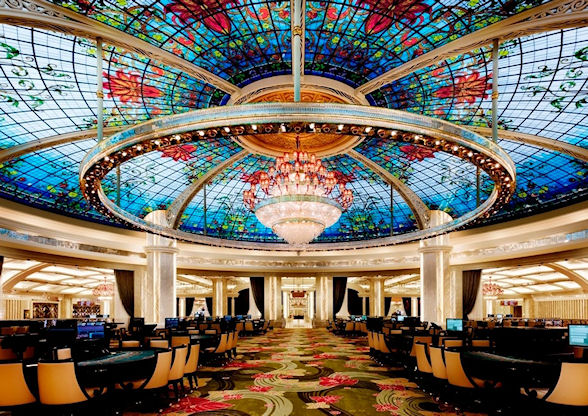
AWS: You didn’t have any sand in Macau so you brought your own.
FL: (laughs) That’s right! At the end of the day we felt we need to understand the customer first. We always ask the question, what will they want in five years time? If we are able to satisfy customers five years ahead of time, we are doing something right. This is why we build what we build, and we have been very accurate in that anticipation and this is why we have been successful. We have to look into a crystal ball, and keeping asking that same question, what would they like in five years? This is no easy guess. The customer we had from Beijing or Shanghai five or ten years ago, is going to look completely different today. All you have to do is go to Shanghai and Beijing and take a look, what they had ten years ago is basically obsolete. So we just have to keep that innovative, creative mindset, and execute well.
AWS: That’s a lovely segue into my next question, talking about what the customer wants in five years time. By then phase 2 of Galaxy Macau should be open. Every morning I wake up in my apartment in Taipa and look out over it all, I have a lovely view of the construction. So far it looks fantastic and it looks like it is going to be quite seamless. Is it running on schedule to open in 2016? What can we expect from it? What will be new and innovative that Macau hasn’t seen before?
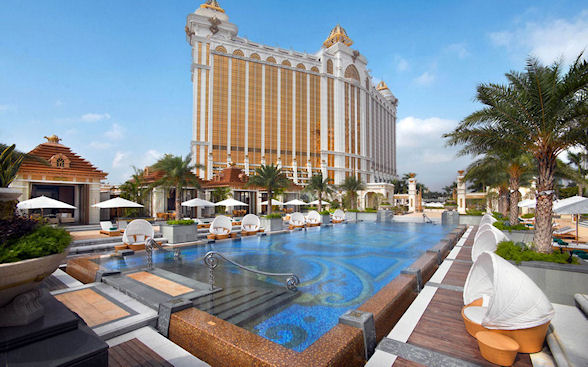
FL: I hope by now you believe in our execution capability. We have demonstrated more than once we are able to keep to a timeline, keep under budget, and execute well, so hopefully we will be on time. We are excited about two components we think we can do better: retail and meeting space. With the bridge from Hong Kong to Macau being completed in 2016, we think that convention and retail business will increase. We want to make sure those two non-gaming components of phase 2 are done better than what we have now, and we think it is going to be very successful.
AWS: But Venetian has already grabbed the retail and MICE space, haven’t they? Their Shoppes Cotai has nearly 600 stores – will your retail be better than that? I can’t image you’ll have more meeting space than them? What might be different to encourage people to come here?
FL: I think we probably would do things similar to phase 1 by making sure it is navigable. Galaxy Macau was built such that you could go from destination A to B in the fastest possible time, without getting lost. You used the word seamless, and hopefully that is what we will achieve. That is probably the most challenging part of phase 2, to make sure it blends into phase 1 so it is easily navigable and you don’t have to go through some convoluted staircases. Certainly there are some creative components we going to put into it, to make sure we differentiate with what other people are doing. Allow me to keep it a little bit of a secret for the moment, but certainly there will be some design you will see.
AWS: Galaxy Macau opened less than 18 months ago, and the focus for the future is obviously on phase 2. But have you already looked at plans for phase 3 and beyond?
FL: Of course! You know that I am an engineer, I am a planner, I am a real estate developer, so when we got that piece of land in 2002, that’s the day I started planning the whole site. So even though we are just announcing phase 2, that doesn’t mean we are not working on other phases. We are just holding on to make sure we adjust our product to the customers. I like opening my property on an incremental basis. We continue to watch the market and the preferences of the customers very carefully, and we continue to tweak our plans, making sure when it is the right time to pull the trigger, we will. We have HK$11 billion cash in our bank account, and we don’t have any debt to be honest, so we have a clean sheet. As you know the market capitalization of the company is already over HK$100 billion so we have the financial firepower to pull the trigger and start phase 3 immediately.
AWS: Galaxy supports all sorts of community projects, such as free cinema trips for the elderly and sponsorship of Galaxy Double R Racing at the Macau Grand Prix, to name just two. What criteria does Galaxy use to decide which projects are worthy of support?
FL: Well, it is a good question. We want to be a part of the society and to support the society. Galaxy is one of the biggest companies in Macau and we have a corporate responsibility to connect with parts of the society, whether it is the elderly, kids, students and so on. Right now we are more into sports events, which was something we started in 2002. That was a time when sports really needed some support. We have fostered very good relationships with sports associations, and we will continue to do that, but that doesn’t mean that we are not looking for other ways to be helpful.
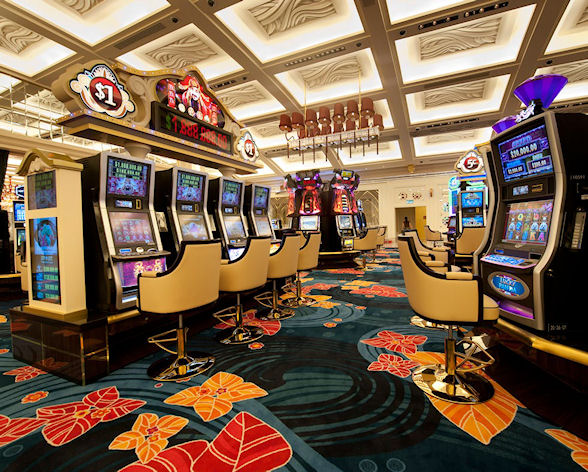
AWS: The four City Clubs (Waldo, Rio, President and Grand Waldo) have a special place in GEG’s history. How does Galaxy now view the City Clubs and what role will they play in the future?
FL: There are customers who like integrated resorts, but there are certainly people who like boutique casinos, where they feel a little bit more intimate and less intimidated so there continues to be room for the smaller City Clubs to survive and prosper, but the emphasis will have to be different. The City Clubs used to be basically VIP baccarat and that’s it. But in the future, the City Clubs will have to adapt to the evolution of customer preferences. These people are looking for more personal services. I see some of our City Clubs recognize their challenges, and they are tweaking their business model so they look after their customers a bit better. I feel there is still a long future for them.
AWS: It’s interesting that the strip say from Kampek through to Lan Kwai Fong and on to Golden Dragon, some of those properties are doing pretty amazing numbers by offering deals directly to players rather than through junkets, is that the way forward for them?
FL: I feel these guys are creative, they are finding a niche for themselves to be able to compete with the bigger boys. Some of them emphasize personal services more and I still see that there are a lot of opportunities for these smaller casinos to be competitive in the future.
AWS: When China Rouge opened back in March it was very clear it was a project close to your heart. At WGM we were so impressed with the design and visuals that we dedicated an eight-page spread in our magazine to China Rouge. My only question at that time was, “is Macau ready for a venue this sophisticated?” Now that six months have passed, has China Rouge lived up to your expectations?
FL: China Rouge is a product that never existed in Macau. I think so far China Rouge meets my expectations, and it is well liked by a lot of people. More and more we find people who are used to the type of offerings we have for them at China Rouge. So I think yes, we are doing well, and in the future, we should be more and more successful.
AWS: How often do you watch a movie at UA Galaxy cinemas? What was the last film you watched there?
FL: I am a movie fan. Sometimes when I stay overnight at Galaxy Macau, I do go to the movies. I am so happy this product was so well received by the citizens of Macau. Again we were looking to create an innovative product. During the last ten years, movie house technology improved so much, but there was nobody investing in this industry in Macau. With the wealth created in the last ten years, people can now afford MOP$80 to buy a ticket in a great movie house. We were spot on in that one, too. The movie house has met our expectations, we are very happy with it. The last movie I watched here was a Mandarin movie, The Disappearing Bullet. I don’t mind if they are in Cantonese, Mandarin or English, I just like to see a good movie. I just enjoy an hour and a half, to help take me away from thinking too much about business.
AWS: You work very long hours. When you are in Macau, do you sometimes slip into the movie house late at night to quietly watch a movie?
FL: In fact, yes, I do. The good thing about our movie house is we have movies past mid-night. Sometimes after dinner I take a shower, go down to the movie house and watch a movie. I don’t sleep until 2am, so after midnight is a perfect time for a movie.
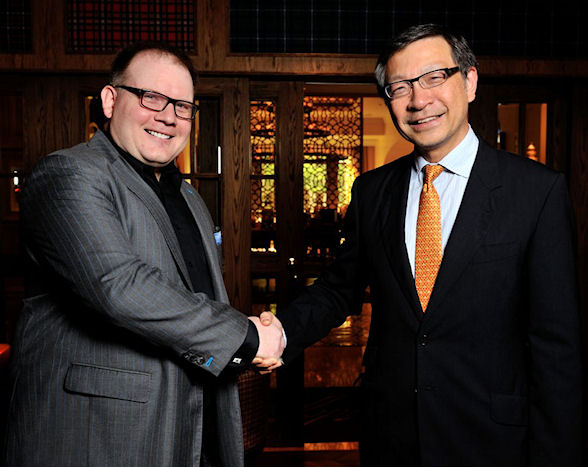
AWS: Francis, thank you for answering so many questions about such a wide range of topics. Do you have any last words?
FL: Just that I feel the last ten years has rushed by so quickly, that nobody really stopped to think. A lot of things that happened were just spontaneous, just reacting. But after 10 years, I think we have learnt a lot. Maybe it is time to pause, sit back, and take on board a couple of lessons. We should sit with the stakeholders of the society and talk about what we want to see in the next ten years. I think with two percent unemployment this might be the right time to put the question on the table and ask, “Guys, what do you want to see?” This has to be facilitated by the government. I would be very happy to be sitting down with some of the labor representatives, to explain how we see the economy and how we will be able to ensure that we can all continue to give priority to the local workforce, and make sure they will continue to have secure employment. If we were able to demonstrate that, would they gradually allow us to open up the import labor quota? I am sure we could have a very intelligent conversation.
AWS: Mr Lui, thank you so much for your generous time, and speaking to the readers of World Gaming magazine.
FL: Thank you Andrew, I really enjoy your magazine.







